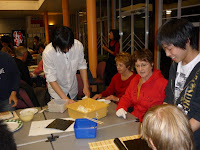Today in class we looked at what students talked about when they went home. It was a great exercise in making students think about who spoke first, what was said and what could have been said. In all of the situations that occur here, the host parent speaks first. I think that it would be good for the students to actually speak first. Why? We discussed why and the students came up with some interesting things. We also looked at how the slightest conversational initiation can lead into a conversational topic, sometimes without any of the participants being aware of what is happening.
In the later stages of the conversation I showed the students the actual function of the utterances that were spoken; for example, why do you think this was said, what was the meaning of saying this etc. This means that the students are coming away from the sentential level (clause, verb, noun, phrase, etc) and focusing their attention on the meaning above this. For example, "did you have a good day?" actually means something like, tell me what you did today using general, details, feelings, and a conclusion. The function that this utterance produces is a sociable function inclusive and meaning "lets narrate." The student's response will send out branches of ideas that will no doubt be subsequently picked up by the parent and then sidelined into another conversational topic. Once again, by making the students aware of the frames and references that are involved within conversations (meta-language) makes them understand, to some extent, of why conversations succeed and/or fail. I then also ask if this happens in Japanese language - again, the idea being to get students thinking about cultural appropriacy and context.HP: Hi [student's name]
Who spoke first in this situation? Why? What does it do?S: hi, [homestay name]
HP: when did you get home?
S: half past five
HP: oh, I'm very tired and I'm hungry, today I didn't eat breakfast or lunch.
S: eh? really are you ok?
HP: oh it was a crazy day ha ha ha ha
S: ha ha ha ha do you want something to drink?
HP: oh, no thanks
S: ok, talk to you later.
This conversation is characterised by short, quick statements that seems to be successful. There is no extension into any topic, but I don't think that that is necessary. In fact, to me the student responded very well. I would recommend that the student concentrate on practising short, quick comments - perhaps a joke would be appropriate. HP: Hi, what did you do today in class?
S: so, oh, um, today I had English and computing class. Computing class was so difficult because so teacher spoke so fast and his writing is difficult to read, but anyway, yeah, how was your day?
This short conversation illustrates quite a simple response. The student does show a general topic, one short detail, their feelings and then passes (just like a rugby ball) the conversational turn over to the parent. HP: Did you have a good day?
S: oh, yeah, I think so, it was a good day oh, um, how are you feeling?
HP: oh, I'm feeling quite bad.
S: Oh, that's too bad, would you like me to do something for you? How about I make you a cup of tea, hot milk.
S: oh, you look very tired, would you like me to help you with anything?
S: oh, you look very tired, look, don't worry about me, I can look after myself. Please just look after yourself. I'm going to let you rest a bit, see you soon.
HP: oh, thanks, but I'm fine. well, actually there is something, could you please take my medicine into my room?
S: sure, no problem.
This conversation shows a successful transference of kindness by the student. If the parent is sick then the student needs to think of strategies in language to excuse themselves from tiring the person who is sick. The expression below achieves this. I think that it would be inappropriate for the student to try to engage their parent in a lengthy conversation here. S: oh, um, excuse me, I just need to do something. I'll be back soon.
How was your day?
Ar, it's kind of good , so same old same old.
HP: Did you wake up at 2 or 3?
QuestionS: yeah, of course because it was very noisy because the cactus was knocking on my window, so I was scared.
ResponseHP: That's too bad. Did you think that it was a ghost?
QuestionS: yes, because I don't like scary things. um I thought that somebody might be looking in the window ha ha ha.
Response - the beginning of a storyHP: ghosts aren't in New Zealand.
CommentS: really? In Japan ghosts come from old stories, for example have you seen Ring? It was very scary. I saw it a long time ago and it was very very scary because when I was watching it I couldn't move. If I watched it I can't sleep. I can't go to the bathroom to do pee. ar, so I don't want to watch any horror movies (ha ha).
Your story from Japan
This conversation really goes to the heart of what I am trying to teach. Again, I asked the students why this conversation worked. It really is a lead into a conversational topic about ghosts and was generated by the student and the parent adding to each other's story.


























